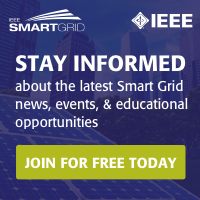A Summary of the Grid 3.0 Workshop
Date: 5 May 2015
IEEE Smart Gird
The Grid 3.0 Workshop held on March 26-27, 2015 built on the success of the November 13, 2015 “Electricity Sector Issues Roundtable: Grid 3.0 and Beyond” is part of a planning process that aims to help shape the grid’s future. The Grid 3.0 activity series was organized by a partnership of several government and industry organizations, including IEEE Smart Grid. The Grid 3.0 Workshop was designed to dive in deeper into the interoperability challenges identified at the Roundtable and to work collaboratively to develop the action plans needed to overcome these challenges.
The Grid 3.0 Workshop brought together experts from a variety of stakeholders including utilities, ISOs / RTOs, regulators, federal agencies, manufacturers and researchers to key topics emerging from the Roundtable discussion, such as: Resilience; reliability (including efficiency and sustainability); emerging and evolving markets; new actors in the grid ecosystem; and the pace of technology innovation. These key topics were developed by the organizing committee, including several derived from the IEEE Smart Grid focus areas.
Some of the “common themes” that emerged from the workshop include the need for:
- Ubiquitous, low cost, reliable, resilient communications
- Clearly defined common and stable (control) business, data management, communications, and physical systems architecture
- Well defined points of interoperability with built in security
- Reference designs (e.g. microgrid systems, distributed generation support systems)
- Regulatory jurisdictional certainty (state/feds) – also need clear metrics
- Education of the workforce
- Broad, equitable collaboration model
Following up on the information that came out of the workshop, the Grid 3.0 Organizing Committee will continue its work to identify the critical actions needed to realize the Grid 3.0 vision. Specifically, it will:
- Continue to refine the common themes from the workshop
- Develop aspirational “future statements” for each theme
- Conduct a gap analysis of: What organizations are working in this space? What relevant work is each organization doing? What’s missing?
- Develop Action Plans around priority gaps
Several of the gaps identified are uniquely suited to being addressed by IEEE Smart Grid and its member societies. Several IEEE PES standards activities such as IEEE 1547 and IEEE 2030 series directly address the gaps identified in architecture, interoperability, and reference designs. The Grid 3.0 Leadership Committee looks forward to working with IEEE Smart Grid and its other members to conduct the gap analysis and suggest specific work items to accelerate progress. Public discussion of Grid 3.0 is encouraged on the IEEE Smart Grid LinkedIn group.
The presentations that were made during the panel sessions can be found here.
View video recordings of several of the sessions. More videos can be found here.
Participate in the Ongoing Discussion During the Next Webinar
A webinar will be held on May 12 at 1 pm (EDT) to provide an update on the process.
Registration information can be found here.


